In this article:
Your health is your biggest gift. At the end of the day, what really matters is that you’re happy and healthy. Even the smallest of health issues can interfere with your quality of life. It is important to commit to healthy life choices.

Poor health habits can cause stress and health complications. Health problems can make your daily chores more challenging and even jeopardize your ability to enjoy your life.
Experts explain how self-care is an important part of leading a happy and balanced life. Not taking care of yourself can manifest in many ways and can negatively impact both your physical and mental health. It can lead to poor self-esteem, sleep disturbances, fatigue, and even depression.
It’s important to remember that not looking after yourself affects not only you but also those around you, including your family and friends.
Habits That Compromise Health
Here are some things you don’t know you’re doing that ruin your health.
1. Poor sleeping habits
A busy life can affect how much sleep you get every night. The National Sleep Foundation indicates how much sleep you need: (1)
- Adults should sleep at least 7–8 hours every night.
- Children and teenagers should sleep 9–11 hours.
Note: The National Sleep Foundation also recommended a quick nap of 20–30 minutes for improving alertness and performance.
Poor quality of sleep causes you to have weak immunity as well as many other health problems. Sleep deprivation can put you at risk of: (2)
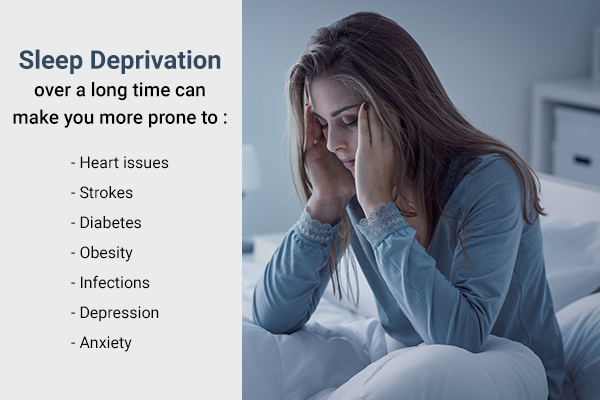
- Heart issues
- Strokes
- Diabetes
- Obesity
- Infections
- Depression
- Anxiety
Golden rules of sleep
Getting good sleep is an important part of managing chronic health conditions, such as mental health issues, diabetes, and hypertension. To ensure quality rest, there are a few golden rules you should follow:
- First, try to create a regular bedtime routine. Even if you don’t fall asleep instantly, make sure you stick to the same bedtime each night.
- Second, if you find yourself lying in bed unable to sleep, try to get up and move to another room until you feel sleepy again. This can help break patterns of sleeplessness.
- Third, avoid smoking before bed, as it can lead to a number of health issues for both men and women. Instead, practice deep breathing exercises to calm your body and mind.
- Finally, remove all electronic devices from your bedroom. This will help to limit your exposure to blue light, which can disrupt your natural sleep cycle. (3)
2. Poor hydration
It is a common practice nowadays to replace your glass of water with a can of soda to quench your thirst. The sugary soda drinks put you at risk of obesity, diabetes, and heart diseases.
Sodas are also known to stimulate sugar cravings and increase your appetite. They typically contain caffeine, which contributes to dehydration.
So, whenever you feel thirsty, opt for a good old glass of water. Water is a critical nutrient that not consuming water for a few days can lead to life-threatening consequences.
The list of positive effects of water on short- and long-term health is quite long. (4)(5)
Note: According to the National Kidney Foundation, you must drink at least 10–12 glasses of fluid daily to keep the kidneys healthy and the body well hydrated. (6)
3. Excessive use of gadgets
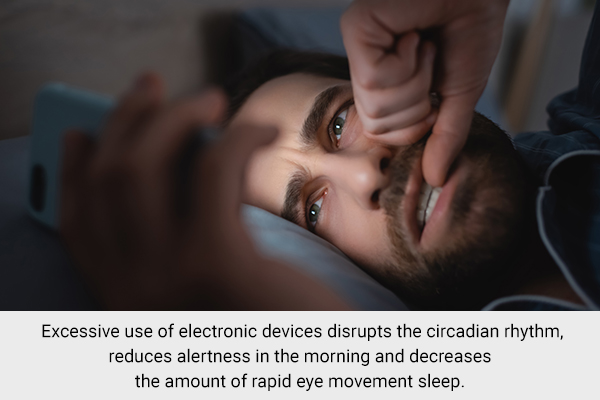
The use of electronic devices for everything from communication to entertainment has vastly increased nowadays. It is simply because of the convenience and ease of use that come with these devices.
The use of such devices is a topic of concern because the light emitted by them disrupts the human circadian rhythm and therefore plays a role in perpetuating sleep deficiency when used before bed.
A disturbance in the circadian rhythm due to excessive use of these devices reduces alertness in the morning and decreases the amount of rapid eye movement (REM) sleep, which is an important phase of the sleep cycle for brain development. (7)
One study revealed associations between increased use of mobile phones and stress, sleep disturbances, and symptoms of depression. (8) Moreover, increased television/screen viewing time can be linked to raised mortality and cardiovascular disease risk. Thus, make sure that you don’t invest a lot of time using your phone or watching TV to ensure good health. (9)
Every 2-hour increase in time of TV watching represents a 23% rise in obesity and a 14% increase in type 2 diabetes mellitus. The rise of consumerism and the use of technology have had negative effects on the academic performance of students.
Social media and smartphones present a major distraction to students, taking away valuable study time and creating an emotional vacuum. This is especially true for young children who, in some cases, are being given mobile devices to stop them from crying or eating.
Excessive use of technology also has wider repercussions, such as aggression and behavioral issues, memory problems, and sleep disturbances. To help combat this problem, it is important for parents, teachers, and students themselves to limit their use of technology, particularly in the mornings and evenings.
Rather than scrolling through their phones when they wake up, students should read something positive, meditate, or go for a walk. Before going to bed, they should make sure to switch off their devices and have a few minutes of quiet time.
With such small changes, it is possible to drastically improve the quality of life for students and make sure that their academic performance is not negatively impacted. (10)(11)
4. Increased levels of stress
Stress weighs down your mind and body. It has a significant impact on your mood, sense of well-being, behavior, and health.
Stress can cause responses generally associated with infection and tissue damage. It can also induce inflammatory responses in the body.
Studies show that chronic stress can cause neuroendocrine and immune imbalances that lead to disease development and increased risk of: (12)
- Cardiovascular dysfunctions
- Diabetes
- Cancer
- Autoimmune disorders
- Mental illnesses such as depression and anxiety
This is why it is important to learn how to deal with stress in a good way to not let it affect your health profile negatively.
5. Not exercising enough
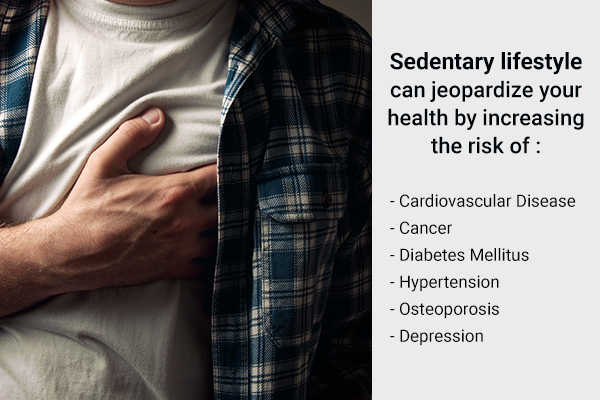
According to the Centers for Disease Control and Prevention, a reduction in daily physical activity is a cause of many of the risk factors that lead to chronic diseases such as diabetes and heart issues.
Nowadays, it is common for people to use motorized transportation such as a cab or an elevator instead of walking or taking the stairs. A sedentary lifestyle influences the human body through diverse mechanisms.
Lack of exercise can decrease cardiac output and systemic blood flow. Sedentary behavior has a negative effect on your health and can increase risks of: (13)
- Cardiovascular diseases
- Cancer
- Diabetes mellitus
- Hypertension
- Osteoporosis
- Depression
This is why you should make sure to spend time doing exercise or taking small steps such as choosing the stairs over elevators.
A recent study by Harvard University’s Framingham Heart Study evaluated the cardiac impact of six major risk factors for cardiovascular diseases in men. The study found that having two or more of these risk factors significantly increases a man’s risk of developing cardiovascular diseases. In fact, a man with two or more risk factors has a 69% chance of developing cardiovascular diseases by age 95, compared to just 5% for a man who is free of all six risk factors. The study also found that a risk-free man can expect to live 11 more years than a man with two or more risk factors. (14)
The risk factors evaluated in the study include high total cholesterol level, low HDL (“good”) cholesterol level, high blood pressure, diabetes, obesity, and smoking. To reduce their risk of cardiovascular diseases, men should take steps to address any of these risk factors they may have, such as quitting smoking, managing their blood pressure, and maintaining a healthy weight. Eating a heart-healthy diet and exercising regularly can help to reduce the risk of cardiovascular diseases and improve overall health. (14)
6. Sitting for long hours
Nowadays, workplaces have changed direction with the nature of jobs shifting from active to sedentary, which promotes long sitting hours. One reason for this is the transition from paper-based work to an online and paperless one.
The conclusions of various studies demonstrate that for each 2-hour increment in sitting time, the risk of various diseases increases. These diseases involve:
- Obesity
- Diabetes
- Low back pain
- Cancer
Research has demonstrated that people who spend most of their time sitting have a 1.4 times greater danger of premature death after 12 years than those who sit for less time. (15)
7. Nail biting
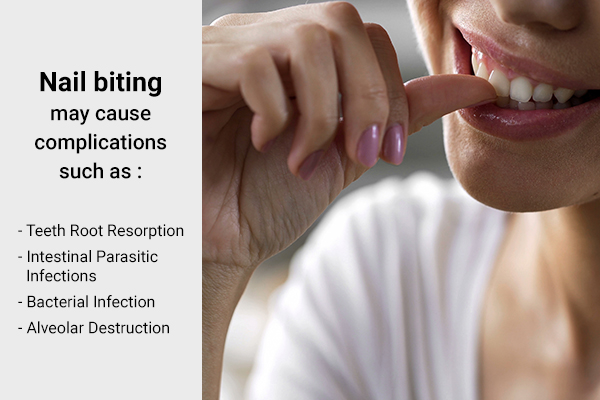
Nail biting, or onychophagia, is a well-known but unresolved medical problem in many people. Nail biting may cause complications such as:
- Tooth root resorption
- Intestinal parasitic infections
- Bacterial infections
- Alveolar destruction
Also, research has shown that nail biting may elevate risks of emotional disorders or psychiatric disorders such as: (16)
- Attention-deficit hyperactivity disorder (ADHD)
- Separation anxiety disorder
- Depression
- Mental retardation
8. Skipping breakfast
Skipping breakfast has become an everyday practice, especially among students, and has been revealed to greatly increase the risks of:
- Overweight
- Type 2 diabetes
- Heart disease
- Negative body perception
- Unhealthy dietary behavior
Moreover, skipping breakfast may cause mental health issues including:
- Stress
- Mental distress
- Depressive mood
- Lower happiness
- Suicidal behavior
- Poor sleep quality
Skipping breakfast has also been linked with substance use, such as smoking and alcohol consumption. Other effects included poor oral hygiene. (17)
Experts explain that it is important to maintain a balanced diet to promote good health and avoid obesity. This means consuming the right amount of calories at different meals, with 700 at breakfast, 250 at lunch, and 50 at dinner, if the goal is 1,000 calories. Additionally, it is important to differentiate between real and emotional hunger, as emotional hunger is often linked to overconsumption of food.
9. Insufficient sun exposure
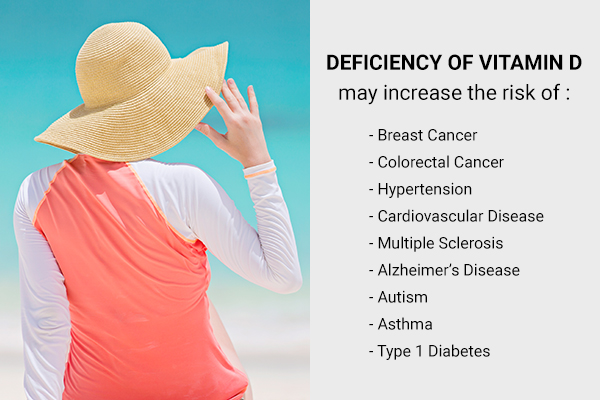
Health experts have been trying to educate the medical community and health authorities on the health benefits of proper sun exposure because inadequate sun exposure is a substantial public health issue.
The production of vitamin D is dependent on sun exposure, and this vitamin is accountable for all the useful effects of sunshine.
A lack of this vitamin due to inadequate sunshine exposure has been studied to lead to increased risks of:
- Breast cancer
- Colorectal cancer
- Hypertension
- Cardiovascular disease
- Multiple sclerosis
- Alzheimer’s disease
- Autism
- Asthma
- Type 1 diabetes
To beat the health issues arising from lack of sunlight, a maximum of 30 minutes of unprotected exposure is advised. (18)
10. Overuse of painkillers
Pain in daily life is often managed with over-the-counter analgesic medications or painkillers. These drugs are incredibly safe, but serious side effects can occur if they’re overused or abused.
For instance, numerous researches and studies in the last few years have demonstrated that certain over-the-counter and prescription medicines known as nonsteroidal anti-inflammatory drugs (NSAIDs; medicines used as painkillers), such as diclofenac, increase the risk of cardiovascular diseases when increased doses are taken over long periods. (19)
Moreover, long-term use of painkillers can have a detrimental effect on the kidneys. NSAIDs are commonly used to treat headaches, pain, fever, and colds. However, if taken for long periods or when a person is dehydrated or their blood pressure is low, these drugs can damage the kidneys or lead to acute kidney injury. (20)
To reduce the risk of kidney damage and other adverse effects, it is important to take NSAIDs with caution and follow the dosage instructions provided by your doctor.
Most-Asked Questions
What is a good time interval between meals?
Researchers have suggested that keeping a longer gap between meals allows the body to process food more efficiently. There is also some research on intermittent fasting, which is suggested to help with weight loss. (21)
Is late-night snacking okay?
Late-night snacking should be avoided because, according to studies, consuming late-night snacks puts you at risk of metabolic syndrome and obesity. (22)
How much activity is good enough for a healthy lifestyle?
You should aim for at least 150 minutes of moderate-intensity physical activity such as brisk walking or jogging every week with a few days of muscle-strengthening activities. (23)
Experts also suggest that people with obesity should walk 2,000 steps a day. They can start with 200 steps and slowly increase.
Final Word
Good health is a must in order to live your life to the fullest. When a person starts to live a healthy lifestyle, their body remains healthy and the mind is in a good place.
It is said that good health is of core importance to human happiness. Thus, keep a check on your daily habits as often, without knowing, you may end up doing things that are harmful to your health.
- Was this article helpful?
- YES, THANKS!NOT REALLY


